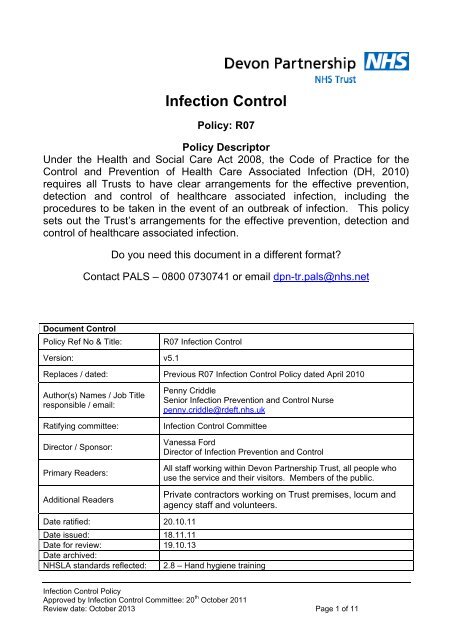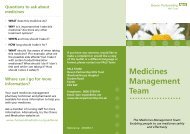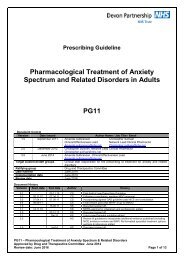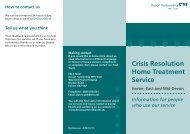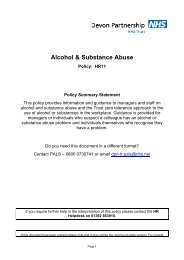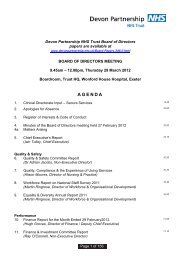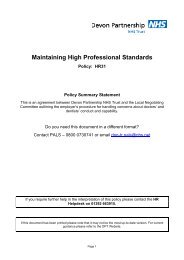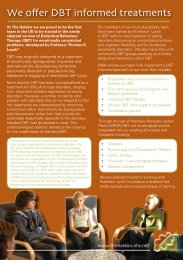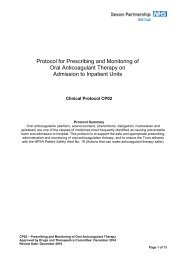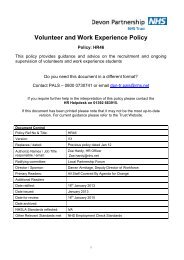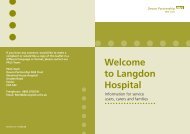Infection Control Policy - Devon Partnership NHS Trust
Infection Control Policy - Devon Partnership NHS Trust
Infection Control Policy - Devon Partnership NHS Trust
You also want an ePaper? Increase the reach of your titles
YUMPU automatically turns print PDFs into web optimized ePapers that Google loves.
<strong>Infection</strong> <strong>Control</strong><br />
<strong>Policy</strong>: R07<br />
<strong>Policy</strong> Descriptor<br />
Under the Health and Social Care Act 2008, the Code of Practice for the<br />
<strong>Control</strong> and Prevention of Health Care Associated <strong>Infection</strong> (DH, 2010)<br />
requires all <strong>Trust</strong>s to have clear arrangements for the effective prevention,<br />
detection and control of healthcare associated infection, including the<br />
procedures to be taken in the event of an outbreak of infection. This policy<br />
sets out the <strong>Trust</strong>’s arrangements for the effective prevention, detection and<br />
control of healthcare associated infection.<br />
Do you need this document in a different format<br />
Contact PALS – 0800 0730741 or email dpn-tr.pals@nhs.net<br />
Document <strong>Control</strong><br />
<strong>Policy</strong> Ref No & Title:<br />
R07 <strong>Infection</strong> <strong>Control</strong><br />
Version: v5.1<br />
Replaces / dated: Previous R07 <strong>Infection</strong> <strong>Control</strong> <strong>Policy</strong> dated April 2010<br />
Author(s) Names / Job Title<br />
responsible / email:<br />
Ratifying committee:<br />
Director / Sponsor:<br />
Primary Readers:<br />
Additional Readers<br />
Penny Criddle<br />
Senior <strong>Infection</strong> Prevention and <strong>Control</strong> Nurse<br />
penny.criddle@rdeft.nhs.uk<br />
<strong>Infection</strong> <strong>Control</strong> Committee<br />
Vanessa Ford<br />
Director of <strong>Infection</strong> Prevention and <strong>Control</strong><br />
All staff working within <strong>Devon</strong> <strong>Partnership</strong> <strong>Trust</strong>, all people who<br />
use the service and their visitors. Members of the public.<br />
Private contractors working on <strong>Trust</strong> premises, locum and<br />
agency staff and volunteers.<br />
Date ratified: 20.10.11<br />
Date issued: 18.11.11<br />
Date for review: 19.10.13<br />
Date archived:<br />
<strong>NHS</strong>LA standards reflected: 2.8 – Hand hygiene training<br />
<strong>Infection</strong> <strong>Control</strong> <strong>Policy</strong><br />
Approved by <strong>Infection</strong> <strong>Control</strong> Committee: 20 th October 2011<br />
Review date: October 2013 Page 1 of 11
Contents<br />
1. Introduction..........................................................................................................3<br />
2. Purpose ...............................................................................................................3<br />
3. Duties ..................................................................................................................4<br />
4. <strong>Infection</strong> <strong>Control</strong> Assurance Framework..............................................................6<br />
5. Training................................................................................................................7<br />
6. Patient And Public Information ............................................................................8<br />
7. Monitoring............................................................................................................8<br />
8. Further Advice – Contacting The <strong>Infection</strong> <strong>Control</strong> Team ....................................8<br />
9. References ..........................................................................................................8<br />
Appendix 1 – Local <strong>Infection</strong> <strong>Control</strong> Documents .......................................................9<br />
Appendix 2 – <strong>Infection</strong> <strong>Control</strong> Assurance Framework .............................................10<br />
<strong>Infection</strong> <strong>Control</strong> <strong>Policy</strong><br />
Approved by <strong>Infection</strong> <strong>Control</strong> Committee: 20 th October 2011<br />
Review date: October 2013 Page 2 of 11
1. Introduction<br />
1.1. Under the Health and Social Care Act 2008, the Code of Practice for the <strong>Control</strong> and<br />
Prevention of Health Care Associated <strong>Infection</strong> (DH, 2010) requires all <strong>Trust</strong>s to have clear<br />
arrangements for the effective prevention, detection and control of healthcare associated<br />
infection, including the procedures to be taken in the event of an outbreak of infection.<br />
2. Purpose<br />
2.1. Aims – This policy will ensure that:<br />
• Responsibility for infection prevention and control is embedded at all levels of the<br />
organisation<br />
• Effective arrangements are in place for the provision of a full infection prevention and<br />
control service including policy production, surveillance, education and training, and<br />
audit led by an <strong>Infection</strong> Prevention and <strong>Control</strong> Team. (IPCT)<br />
• <strong>Infection</strong> control advice is provided by a suitably qualified and resourced team, which<br />
includes an <strong>Infection</strong> <strong>Control</strong> Doctor and <strong>Infection</strong> Prevention and <strong>Control</strong> Nurses, with<br />
administrative and information technology support.<br />
• The <strong>Infection</strong> Prevention and <strong>Control</strong> Team is supported by adequately resourced and<br />
staffed microbiology laboratories capable of promptly processing and reporting results<br />
on specimens sent for investigation.<br />
• A multi-professional <strong>Infection</strong> <strong>Control</strong> Committee is in place to advise and support the<br />
IPCT.<br />
• All healthcare personnel working within the scope of this policy are aware of the<br />
rationale and responsibility to maintain high standards of infection control at all times.<br />
2.2. Objectives<br />
• To reduce healthcare associated infection by providing the highest possible standards<br />
of infection control management within the limitations of available resources.<br />
• To provide locally adapted guidelines as statements of good practice based on<br />
systematic review of research and other evidence. Appendix 1 details the infection<br />
control policies and clinical care protocols in place to achieve compliance with the<br />
Health and Social Care Act 2008. These documents are available on the <strong>Infection</strong><br />
<strong>Control</strong> pages of the intranet.<br />
• To generate infection surveillance data and feedback results to relevant parties in order<br />
to reduce mortality and morbidity and improve the quality of care.<br />
• To audit practice in relation to infection control policies and protocols and disseminate<br />
findings to appropriate groups.<br />
• To ensure an ongoing education programme, tailored to meet the needs of individual<br />
groups of staff, is available for all personnel.<br />
<strong>Infection</strong> <strong>Control</strong> <strong>Policy</strong><br />
Approved by <strong>Infection</strong> <strong>Control</strong> Committee: 20 th October 2011<br />
Review date: October 2013 Page 3 of 11
3. Duties<br />
3.1. Board of Directors and Chief Executive – The Board of Directors, via the Chief<br />
Executive, are responsible for:<br />
• Ensuring there are effective and adequately resourced arrangements for infection<br />
control within the organisation.<br />
• Identifying a Board level lead for infection control.<br />
• Ensuring that the role and functions of the Director of <strong>Infection</strong> Prevention and <strong>Control</strong><br />
are satisfactorily fulfilled by appropriate and competent persons as defined by DH,<br />
(2004b)<br />
• Approving the infection prevention and control annual programme, receiving the DIPC’s<br />
annual report and any other reports regarding the state of infection control within the<br />
organisation.<br />
• Ensuring that appropriate systems are in place for:<br />
o reviewing reports and statistics on the incidence of alert organisms (e.g. MRSA,<br />
Clostridium difficile) and conditions, outbreaks and Serious Untoward Incidents<br />
• ensuring that clinical responsibility for infection prevention and control is effectively<br />
devolved to:<br />
o<br />
o<br />
All professional clinical groups in the <strong>Trust</strong><br />
Clinical Directorates and matrons where appropriate.<br />
3.2. Director of <strong>Infection</strong> Prevention and <strong>Control</strong> – The DIPC will:<br />
• Oversee local control of infection policies and their implementation.<br />
• Be responsible for the <strong>Infection</strong> Prevention and <strong>Control</strong> Team within the healthcare<br />
organisation.<br />
• Report directly to the Chief Executive and the Board of Directors and not through any<br />
other officer.<br />
• Challenge inappropriate clinical hygiene practice as well as antibiotic prescribing<br />
decisions.<br />
• Assess the impact of all existing and new policies and plans on infection and make<br />
recommendations for change.<br />
• Be an integral member of the organisation's clinical governance and patient safety<br />
teams and structures, providing regular reports and decision briefings to the Safety and<br />
Risk Committee.<br />
• Produce an Annual Report on the state of healthcare associated infection in the<br />
organisation(s) for which he/she is responsible and release it publicly.<br />
<strong>Infection</strong> <strong>Control</strong> <strong>Policy</strong><br />
Approved by <strong>Infection</strong> <strong>Control</strong> Committee: 20 th October 2011<br />
Review date: October 2013 Page 4 of 11
3.3. <strong>Infection</strong> Prevention and <strong>Control</strong> Team – The IPCT is responsible for:<br />
• Ensuring advice on infection control is available on a 24-hour basis.<br />
• Formulating an annual <strong>Infection</strong> Prevention and <strong>Control</strong> Programme in full consultation<br />
with the <strong>Infection</strong> <strong>Control</strong> Committee (ICC), health professionals and senior managers.<br />
The programme will include surveillance of infection and audit of the implementation of<br />
and compliance with selected policies.<br />
• In liaison with other relevant staff preparing, reviewing and updating evidence-based<br />
policies and guidelines in line with relevant Department of Health notifications and/or<br />
national guidelines, when available and applicable (see Appendix 1).<br />
• Identifying and controlling outbreaks in collaboration with the Consultant for<br />
Communicable Disease <strong>Control</strong> and outbreak control group as appropriate.<br />
• Ensuring the provision of education to all grades of staff working within the scope of this<br />
policy (see Section 6).<br />
• Liaising with the Occupational Health Department, Consultant in Communicable<br />
Disease <strong>Control</strong>, the Health Protection Agency and other external services or agencies<br />
where applicable.<br />
3.4. The <strong>Infection</strong> <strong>Control</strong> Committee – Responsibilities of the ICC include:<br />
• Advising and supporting the IPCT.<br />
• Drawing to the attention of the Chief Executive, either through the DIPC or, if<br />
necessary, directly, any serious problems or hazards relating to infection control.<br />
• Considering reports on infections and infection control problems.<br />
• Discussing and endorsing a plan for the management of outbreaks in the <strong>Trust</strong> and<br />
monitoring its implementation.<br />
• Discussion and endorsement of a plan for the <strong>Trust</strong>’s response to major outbreaks in<br />
the community – the Major Incident (outbreak) Plan – and monitoring of its<br />
implementation.<br />
• Collaborating with the IPCT to develop the Annual <strong>Infection</strong> Prevention and <strong>Control</strong><br />
Programme, monitor its progress, assist in its effective implementation and review the<br />
annual report.<br />
• Providing advice regarding the most effective use of resources available for<br />
implementation of the programme and for contingency requirements.<br />
• Creating, reviewing and monitoring the <strong>Infection</strong> <strong>Control</strong> Assurance Framework<br />
(see Section 5.0 and Appendix 2).<br />
• Advising on and approving all infection control policies before their submission to the<br />
Chief Executive for approval, and review of their implementation.<br />
• Promoting and facilitating the education of all grades of staff in infection control<br />
procedures.<br />
<strong>Infection</strong> <strong>Control</strong> <strong>Policy</strong><br />
Approved by <strong>Infection</strong> <strong>Control</strong> Committee: 20 th October 2011<br />
Review date: October 2013 Page 5 of 11
3.5. Operational Managers – Each management team will:<br />
• Ensure a nominated Matron provides representation at the <strong>Infection</strong> <strong>Control</strong> Committee.<br />
• Ensure that every ward/in-patient unit has a designated infection control link<br />
practitioner.<br />
• Ensure that recommendations from infection control audits, essential steps monitoring<br />
or other related infection control activities are implemented.<br />
• Ensure that all healthcare staff are up to date with infection control compulsory training.<br />
• Ensure that good infection control practice is promoted within the workplace and where<br />
concerns exist these are escalated to the infection prevention and control team.<br />
3.6. Healthcare Personnel<br />
3.6.1. All healthcare staff have a duty to act on and report at the earliest opportunity,<br />
conditions or incidents that may be deemed infectious to others, e.g. communicable/<br />
notifiable diseases and resistant organisms.<br />
3.6.2. All healthcare staff are required to adhere to the policies, guidelines and procedures<br />
pertaining to the prevention and control of healthcare associated infection which<br />
provide a framework for safe and best practice.<br />
3.6.3. These guidelines are based on the recommendations of recognised national<br />
organisations/bodies including:<br />
• Department of Health <strong>Infection</strong> <strong>Control</strong> Nurses Association<br />
• <strong>NHS</strong> Estates Health Protection Agency<br />
• Health & Safety Commission Royal College of Nursing<br />
• Health & Safety Executive Association of Medical Microbiologists<br />
• Hospital <strong>Infection</strong> Society National Patient Safety Agency<br />
• National Audit Office <strong>Infection</strong> Prevention Society<br />
• Medicines & Healthcare Products Regulatory Agency (Formerly MDA)<br />
4. <strong>Infection</strong> <strong>Control</strong> Assurance Framework<br />
4.1 Appendix 2 illustrates how the Board of Directors is assured on infection control issues. Key<br />
strategic objectives relating to infection control are an integral component of the <strong>Trust</strong><br />
assurance framework. Should any of these objectives be assessed as medium or high risk<br />
then they are considered for inclusion on the <strong>Trust</strong> Corporate Risk Register/Assurance<br />
Framework. This document is reported to the Board of Directors on a monthly basis.<br />
4.2 Activities to demonstrate that infection control is an integral part of clinical and corporate<br />
governance will include:<br />
• Regular presentations from the Director of <strong>Infection</strong> Prevention and <strong>Control</strong> (DIPC)<br />
and/or the IC Team to the Board of Directors, e.g. the presentation of the DIPC’s annual<br />
infection control report.<br />
• The review of statistics on incidence of alert organisms (e.g. MRSA, Clostridium<br />
difficile) and conditions, outbreaks and Serious Untoward Incidents, via monthly<br />
<strong>Infection</strong> <strong>Control</strong> <strong>Policy</strong><br />
Approved by <strong>Infection</strong> <strong>Control</strong> Committee: 20 th October 2011<br />
Review date: October 2013 Page 6 of 11
performance scorecard reporting. Review will be through the <strong>Infection</strong> <strong>Control</strong><br />
Committee and the DIPC’s annual report.<br />
• An audit programme to ensure that compliance with policies has been met. This is<br />
included in the annual <strong>Infection</strong> <strong>Control</strong> Programme.<br />
4.3 The <strong>Infection</strong> Prevention and <strong>Control</strong> Programme is developed annually and approved by<br />
the Board of Directors. The programme:<br />
5. Training<br />
• Sets objectives<br />
• Identifies priorities for action<br />
• Provides evidence that relevant policies have been implemented to reduce HCAI<br />
• Progress against the objectives of the programme is reported in the DIPC’s quarterly<br />
and annual report.<br />
5.1. All staff working within the <strong>Trust</strong> must be trained in infection prevention and control<br />
procedures, including hand hygiene. This will be delivered to all staff and volunteers, both<br />
clinical and non-clinical, as part of induction training in accordance with the <strong>Trust</strong> Induction<br />
<strong>Policy</strong>.<br />
5.2. All staff who have direct or indirect contact with patients and/or blood and other body fluids<br />
will must receive an annual update in accordance with the Training Needs Analysis (see<br />
paragraph 5.6.1)<br />
5.3. Attendance at infection control training will be monitored quarterly through the <strong>Infection</strong><br />
<strong>Control</strong> Committee. The committee will bring areas of concern to the attention of the<br />
Board of Directors.<br />
5.4. Workforce Planning and Development will submit reports of training attendance to unit<br />
managers to ensure that non-attendees are followed up.<br />
5.5. Staff hand hygiene leaflets are available in all ward areas and it is the responsibility of the<br />
manager in each area to highlight this to any temporary staff undertaking work in that area.<br />
5.6. Training Needs Analysis<br />
5.6.1. All staff are required to receive infection control training on an annual basis.<br />
Identification of staff groups that require training and frequency of such training can<br />
be found on the Learning and Development Service (LDS) electronic Training<br />
Needs Analysis on the <strong>Trust</strong>’s intranet:<br />
http://rdeweb/userdata/documents/10942/Compulsory%20Training%20Grid%20Jun<br />
e%2009%20MASTER%20COPY.xls<br />
5.6.2. The detail relating to training provided is available through the e-training prospectus<br />
held on Workforce Planning and Development pages of the <strong>Trust</strong>’s intranet.<br />
<strong>Infection</strong> <strong>Control</strong> <strong>Policy</strong><br />
Approved by <strong>Infection</strong> <strong>Control</strong> Committee: 20 th October 2011<br />
Review date: October 2013 Page 7 of 11
6. Patient And Public Information<br />
6.1. Information relating to the <strong>Trust</strong>’s general processes and arrangements for preventing and<br />
controlling infection can be found on the <strong>Trust</strong>’s website at<br />
http://www.devonpartnership.nhs.uk/<strong>Infection</strong>-<strong>Control</strong>.312.0.html&0=<br />
6.2. The website contains links to the <strong>Trust</strong>’s <strong>Infection</strong> Prevention and <strong>Control</strong> Annual Report,<br />
and an information leaflet, for service users and visitors containing practical advice about<br />
infection control.<br />
6.3. Information leaflets for MRSA, C. difficile, Norovirus and hand hygiene are made available<br />
for staff to provide to those who use the service to supplement verbal information. These<br />
are reviewed three yearly or sooner in light of significant changes in national/local practice<br />
and/or legislation.<br />
7. Monitoring<br />
7.1. This policy will be monitored by the <strong>Infection</strong> <strong>Control</strong> Committee and reported to the<br />
Quality and Safety Committee and Board of Directors as identified in the assurance<br />
framework attached at Appendix 2.<br />
8. Further Advice – Contacting The <strong>Infection</strong> Prevention and <strong>Control</strong> Team<br />
• Further advice can be obtained from the <strong>Infection</strong> Prevention and <strong>Control</strong> Team:<br />
<strong>Infection</strong> <strong>Control</strong> Doctor<br />
Lead Nurse<br />
Tel (01392) 40 2961 Tel (01392) 40 2690<br />
Radiopage via 01392 411611 Radiopage via 01392 411611<br />
Consultant Microbiologists<br />
<strong>Infection</strong> <strong>Control</strong> Nurses<br />
Tel (01392) 40 2973/ 2970 Tel (01392) 40 2355<br />
Radiopage via switchboard<br />
Consultant for Communicable Disease <strong>Control</strong><br />
Tel 0844 225 3557<br />
Radiopage via 01392 411611<br />
9. References<br />
DH (2010) The Health Act 2008. Code of Practice on the Prevention and <strong>Control</strong> of <strong>Infection</strong>s<br />
and related guidance. London DH Available at: < Accessed on 28/09/11.<br />
http://www.dh.gov.uk/prod_consum_dh/groups/dh_digitalassets/documents/digitalasset/dh_123<br />
923.pdf<br />
<strong>Infection</strong> <strong>Control</strong> <strong>Policy</strong><br />
Approved by <strong>Infection</strong> <strong>Control</strong> Committee: 20 th October 2011<br />
Review date: October 2013 Page 8 of 11
Appendix 1 – Local <strong>Infection</strong> <strong>Control</strong> Policies, Protocols, Guidance and Guidelines<br />
The following is a list of current infection control documents available on the intranet.<br />
<strong>Infection</strong> <strong>Control</strong> Policies, Protocols, Guidance and Guidelines for <strong>Devon</strong><br />
<strong>Partnership</strong> <strong>Trust</strong><br />
Animals & Pets in Health Care Facilities – Guidance on<br />
Antimicrobial policy<br />
Aseptic Technique<br />
C.Difficile & Antibiotic Associated Colitis Guidelines<br />
Decontamination <strong>Policy</strong><br />
Extended Spectrum Beta Lactamases (ESBLs) and Resistant AMP C Type Beta<br />
Lactamases (AMP Cs)<br />
Hand Hygiene <strong>Policy</strong><br />
Herpes Simplex<br />
<strong>Infection</strong> <strong>Control</strong> <strong>Policy</strong><br />
Inoculation Injury <strong>Policy</strong><br />
Legionella <strong>Control</strong> <strong>Policy</strong><br />
Major Outbreak Plan<br />
Measles Information & Guidance<br />
MRSA – Guidelines for the Management & <strong>Control</strong> of<br />
Scabies Guidance<br />
Source Isolation <strong>Policy</strong><br />
Staff Health & Illness<br />
Standard <strong>Infection</strong> <strong>Control</strong> Precautions<br />
Surveillance and Reporting of Infectious Disease, Healthcare Associated <strong>Infection</strong> &<br />
Antibiotic Resistant Organisms – <strong>Policy</strong> for<br />
TSE <strong>Policy</strong><br />
Vancomycin/Glycopeptide Resistant Enterococci (VRE/GRE) Guidelines<br />
Varicella Zoster (VZ) Virus (Chickenpox & Shingles)<br />
Viral Gastroenteritis Guidance<br />
Ward Closure due to a Suspected or Confirmed Outbreak of <strong>Infection</strong><br />
<strong>Infection</strong> <strong>Control</strong> <strong>Policy</strong><br />
Approved by <strong>Infection</strong> <strong>Control</strong> Committee: 20 th October 2011<br />
Review date: October 2013 Page 9 of 11
Appendix 2 – <strong>Infection</strong> <strong>Control</strong> Assurance Framework<br />
Regularity<br />
• Monthly<br />
• Quarterly<br />
• Six monthly<br />
• Annually<br />
• Bi-yearly meetings<br />
• Ad hoc meetings<br />
• Monthly,<br />
Quarterly<br />
(full report)<br />
• Quarterly<br />
• As required<br />
• As required<br />
INFORMATION<br />
TREE<br />
TREE<br />
<strong>Trust</strong> Board<br />
of Directors<br />
DIPC/CE<br />
Safety & Risk<br />
Committee<br />
<strong>Infection</strong> <strong>Control</strong><br />
Committee<br />
Clinical Directorates<br />
IC<br />
Error!<br />
Reporting<br />
• Monthly performance report<br />
• DIPC annual report<br />
• Key issues<br />
• Instant reporting of any<br />
emerging HCAI issues<br />
• <strong>Infection</strong> control report<br />
• Assurance report<br />
• Outbreak report<br />
• Quarterly infection control<br />
minutes<br />
(with details of all HCAI)<br />
• Root cause analyses<br />
• Outbreak reports<br />
• PEAG/Matron’s meetings reports<br />
Reports: Hand hygiene compliance charts<br />
Audit reports<br />
RESPONSE TO<br />
VARIANCE<br />
For example:<br />
If an outbreak<br />
occurs, it is<br />
discussed with<br />
DIPC and relevant<br />
managers who are<br />
updated daily. Ad<br />
hoc outbreak<br />
meetings called as<br />
required.<br />
Outbreak reports<br />
are circulated and<br />
reports taken to<br />
the <strong>Infection</strong><br />
<strong>Control</strong> committee<br />
and Quality and<br />
Safety committee.<br />
Performance<br />
Reports to the<br />
Board.<br />
Healthcare associated infection reporting mechanisms<br />
Page 10 of 11
TARGET PRIMARY DRIVERS SECONDARY DRIVERS IMPROVEMENT DRIVERS<br />
Environment<br />
Equipment<br />
Housekeeping<br />
Estates<br />
• PEAT scores*<br />
• IC audit*<br />
• National cleaning<br />
standards audit*<br />
• PALS/complaints*<br />
• Modern Matron reviews<br />
• Safe Management of<br />
Healthcare Waste<br />
HCAI<br />
Human Factors<br />
Hand Hygiene<br />
Leadership<br />
Education<br />
• Audit*<br />
• Hand Hygiene<br />
monitoring*<br />
• <strong>Policy</strong>/leaflets<br />
• E-learning for Staff*<br />
• Practical hand hygiene<br />
training<br />
Systems<br />
<strong>Infection</strong><br />
<strong>Control</strong> <strong>Policy</strong><br />
Surveillance<br />
Antimicrobial <strong>Policy</strong><br />
• Daily monitoring via ICNet<br />
laboratory surveillance<br />
• Rapid Norovirus testing*<br />
• IC Alert flag on Rio<br />
• Essential steps monitoring<br />
• Risk assessment forms<br />
*measurable outcomes<br />
Page 11 of 11


